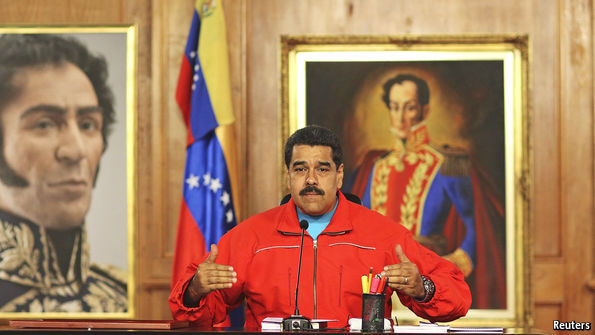Venezuela’s election
A democratic counter-revolution
Voters have rebuked a repressive regime. Now they must have a chance to recall the president

THE parliamentary election that took place in Venezuela on December 6th had been seen by the president, Nicholás Maduro, as a referendum on its “Bolivarian revolution”. The results are in, and the revolution has been resoundingly rejected (see article). The Democratic Unity alliance (MUD), an opposition coalition united by its desire to end the incompetent and authoritarian regime of Mr Maduro and his fellow Bolivarians, won a “supermajority” of two-thirds of the seats in the National Assembly. This is a catastrophe for the movement founded by Hugo Chávez, a charismatic populist who took power in 1999 and died in 2013, leaving the hapless Mr Maduro in charge.
For everyone else, it is a result to be celebrated. The Bolivarians fought dirty: they jailed opposition leaders and banned others from running, nobbled the independent press and put up a sham party to siphon votes away from the MUD. They lost anyway. That is because the government’s delusional policies, conceived to help the poor, are making all Venezuelans suffer bar a corrupt few. Its “21st-century socialism” is a farrago of controls—of prices, foreign exchange and production. When oil prices were high, the country squandered its earnings on subsidies; now earnings from oil have plunged, leading to shortages of basic goods and an inflation rate that is one of the world’s highest. The economy is expected to shrink by 10% this year. Nearly three-quarters of voters turned out; they rejected the government by a whopping 15 percentage points.
But the opposition’s victory is incomplete, and the system it confronts is entrenched. Mr Maduro is not due to face an election until 2018. He has accepted the voters’ verdict but misunderstood its message. He blamed his party’s loss on an imaginary “economic war” against the government. Some leaders of the MUD hope that pragmatic chavistas will push Mr Maduro aside, roll back the barmiest Bolivarian policies and work with the opposition to rebuild democracy. It is more likely that the regime will subvert the new National Assembly.
What comes next
The opposition should therefore move to push Mr Maduro out of office through a recall referendum. That is a democratic procedure, allowed by Venezuela’s constitution. A successful recall would be followed by a presidential election, which the opposition would stand a good chance of winning, so long as it unites around a single candidate. Some may object that a recall vote would distract politicians from the more urgent task of relieving Venezuelans’ economic misery. The Economist has made a similar argument about the unjustified impeachment of Brazil’s president, Dilma Rousseff. But Brazil is not Venezuela. Ms Rousseff, for all her failings, leads a vigorous democracy and is at least trying to deal with her country’s economic problems. The same cannot be said of Mr Maduro.
Ordinary Venezuelans care less about who is in charge than about shortages, prices and jobs. Even under a new government, things will get worse before they get better. Reformers will have to devalue the bolívar, whose official level is nearly 150 times its black-market rate, raise the price of petrol, which now costs practically nothing, and reduce the budget deficit, which is roughly 20-30% of GDP. Devaluing the currency and freeing prices will push up inflation, which hits the poor hardest. A reforming government will need help from the IMF to cushion the pain of adjustment.
The opposition won the election with vague promises of change. To replace the bumbling Bolivarians, it must offer a plan to rescue the economy and be honest with voters about the sacrifices that will require. In the meantime, it should use its dominance of the legislature to repair Venezuela’s democracy. Freeing political prisoners, including Leopoldo López, an opposition leader, is just a start. The MUD’s two-thirds majority offers a chance to replace Supreme Court judges and election commissioners, who now answer slavishly to the regime. It must resist the temptation to replace one set of hacks with another. Chávez came to power because an earlier generation of leaders governed in the interests of a corrupt elite. Today’s victorious opposition must not make the same mistake.

No hay comentarios:
Publicar un comentario